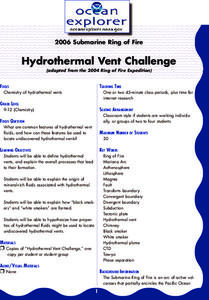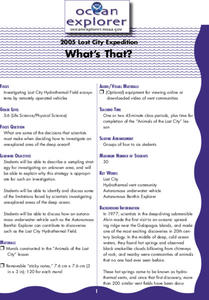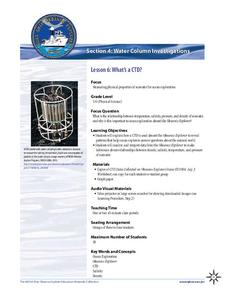Curated OER
Hydrothermal Vent Challenge
Give our ocean voyagers the "Hydrothermal Vent Challenge!" It is a worksheet that guides them through an exploration of hydrothermal vents and the chemical reactions that occur when lava meets seawater. Using a collection of websites,...
Curated OER
Where Did They Come From?
Give science learners nine questions about the biogeography of hydrothermal vents and turn them loose to research this fascinating habitat. Working in cooperative groups, they prepare a report that addresses each of the questions. A...
Curated OER
Where's Dinner?
Upcoming marine biologists consider a list of organisms residing near the Lost City hydrothermal vents and construct a food web. They compare the food web to that of a cold seep community, of which they should have previous knowledge....
Curated OER
Towers of the Lost City
Middle school marine scientists compare the pH change in distilled and saltwater as acetic acid is added one drop at a time. Then they compare the pH change in both when sodium hydroxide is added. This experiment demonstrates the...
NOAA
The Oceanographic Yo-yo
How does chemistry help deep-sea explorers? Part four of a five-part series of lessons from aboard the Okeanos Explorer introduces middle school scientists to technologies used in ocean exploration. Groups work together to analyze data...
NOAA
A Quest for Anomalies
Sometimes scientists learn more from unexpected findings than from routine analysis! Junior oceanographers dive deep to explore hydrothermal vent communities in the fourth lesson in a series of five. Scholars examine data and look for...
Curated OER
What's That?
Meant to be a simulation of a deep-sea exploration, this requires that another activity be completed first. In that activity, titled "Animals of the Lost City," marine biology buffs construct murals of benthic communities. In this...
Curated OER
Life is Weird
Separate your science class into small groups and assign each a specific deep-sea organism to research. The class will learn about all of the organisms as each group presents their assigned animal. Following their presentations, you can...
National Geographic
Ocean Exploration
Dora, Dora, Dora, Dora, Dora! This may be your little ones' best guess as to what it's like to be an explorer! Give them a deeper understanding with this compact examination. A four-minute video introduces them to Robert Ballard, the...
Curated OER
Massif Mystery
After reviewing plate tectonic theories and the discovery of both the Atlantis Massif and the Lost City hydrothermal vents, earth science learners complete a worksheet and participate in discussions about what the types of rock found...
NOAA
Deep-Sea Ecosystems – Entering the Twilight Zone
Imagine an ecosystem without any light or oxygen, where living things convert carbon dioxide into food. This ecosystem is thriving and might just be the largest ecosystem on our planet, yet we know very little about it. The instructional...
NOAA
A Moving Crust
Young scientists piece together the geological puzzle that is the earth in the third and final lesson of this earth science series. With the help of numerous multimedia resources and a series of engaging hands-on activities, students...
NOAA
Animals of the Fire Ice
When the sun's rays can't reach the producers in a food web, where does all the energy come from? Extreme environments call for extreme food sources. Young scientists investigate creatures that appear to get their energy from methane...
NOAA
What's a CTD?
Why are the properties of the water important when exploring the ocean? Young scientists discover the tools and technology used in deep sea exploration in the fourth installment in a five-part series. Groups work together to examine...
Other popular searches
- Facts for Hydrothermal Vents
- Hydrothermal Vents Facts
- Hydrothermal Vents Food Web
- Hydrothermal Vents Bacteria
- Facts on Hydrothermal Vents















